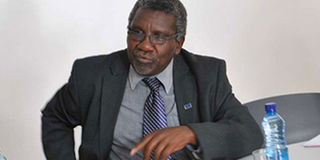Varsity told to suspend student recruitment and await report

Commission of University Education chairman Prof Chacha Nyaigoti Chacha. The CUE today stands as the prime example of the pitfalls of our obsession with form over substance, even unto our own demise. PHOTO | FILE | NATION MEDIA GROUP
What you need to know:
- In April, the Kenya University and Colleges Central Placement Service (KUCCPS) did not place students at the institution.
- The university first admitted students in 2008 after it was issued with a letter of interim authority on August 10, 2007.
- Once a letter of interim authority is revoked, an institution is allowed to teach out all students or give them to another institution.
The Commission for University Education (CUE) has asked the Presbyterian University of East Africa, whose licence was revoked early this year, to suspend recruitment of new students.
CUE Chairman Chacha Nyaigoti Chacha said the university should wait for the report of a three-member team that was appointed by the Ministry of Education to work with it following the revocation.
The university has been running an ambitious recruitment exercise for students through various media outlets, churches and road shows despite the revocation.
In April, the Kenya University and Colleges Central Placement Service (KUCCPS) did not place students at the institution.
REPORT SUBMITTED
“The report has already been submitted to the Cabinet Secretary Amina Mohamed. It will determine if the institution will be allowed to continue to operate or will be completely shut down,” said Prof Chacha.
However, he declined to disclose the content of the report, saying the team was set up by the ministry and its only Ms Mohamed who can make the findings public.
APPEAL
The team comprises Prof Crispus Kiamba, Prof James Tuitoek (Egerton University) and Prof Ratemo Michieka (Jomo Kenyatta University of Agriculture and Technology).
However, the university’s acting Vice-Chancellor, John Mungania, said there was nothing wrong with recruiting students insisting that the institution appealed the revocation.
“When you appeal, the revocation stands suspended and, therefore, you continue with normal activities. There is no illegality as the university has to function,” said Prof Mungania.
However, he did not disclose the number of students they have admitted so far since the revocation of the letter of interim authority with effect from January 23, 2018.
LETTER REVOKED
In a report to the CS dated January 22, CUE recommended that the letter of interim authority awarded to the university in 2007 be revoked, citing unpaid arrears and lack of adequate resources to meet its obligations.
The university first admitted students in 2008 after it was issued with a letter of interim authority on August 10, 2007. It is yet to get a charter.
According to Universities Act 2012, the Cabinet Secretary may, on the recommendation of the Commission or on application by the respective institution, revoke a letter of interim authority in accordance with regulations on the winding up of universities and shall issue a Gazette notice to that effect.
Once a letter of interim authority is revoked, an institution is allowed to teach out all students or give them to another institution.





